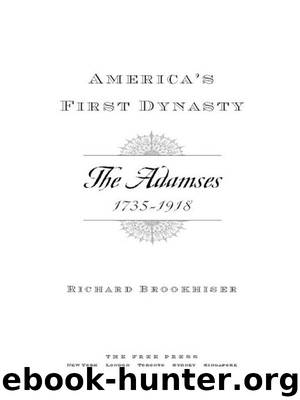America's First Dynasty by Richard Brookhiser

Author:Richard Brookhiser
Language: eng
Format: epub
Publisher: Simon & Schuster
Published: 2002-07-15T00:00:00+00:00
____________________
ADAMS WAS AHEAD of his time. The country reacted to the prospective collapse of its political arrangements by making one more effort to prop them up. It was the last hurrah of the freshman class of 1811. Adams went to Washington in 1849, as the new administration and Congress were getting under way, to scout the situation for the Free Soil party. He concluded that the seventy-two-year-old Henry Clay did not know “at which end to begin,” and that the “only systematic statesman remaining” was the dying sixty-seven-year-old John Calhoun. “His system . is ‘a dissolution of the Union’ and its consequence, ‘a slaveholding confederacy.’ ” But Clay trumped Calhoun. Clay's last negotiation, known as the Compromise of 1850, extended the line of the Missouri Compromise to the border of California, which was admitted as a free state; sixty-eight-year-old Daniel Webster, of the class of 1813, gave his last great speech in support of it. The boundaries of bondage and freedom in North America seemed settled, and both the establishment and the public hoped not to discuss the question again. The mood, Adams realized, left the Free Soil movement “afloat on a wide sea of uncertainty.” 1
But at the same time new politicians were emerging who disliked the new mood. Two of the most prominent, on the antislavery side, already well-known to Adams, would be colleagues and rivals for the next twenty years.
In 1851, Democrats and Free Soilers in Massachusetts made a deal dividing the important offices among themselves, and freezing out the Whigs. The Free Soil party gave its spoil, a Senate seat, to its most eloquent orator, Charles Sumner. Sumner had grown up in Boston, on the wrong side of Beacon Hill: His mother was a seamstress, his father the illegitimate son of a lawyer. As a boy Charles persuaded his father to send him to a good school by teaching himself elementary Latin in secret. He claimed Demosthenes and Pericles as models; though the law was his profession, the podium was his home. He had a strong bass voice, and a face that managed simultaneously to be striking, brutal, and sensual. He quickly made a reputation for high and uncompromising idealism, and for venomous attacks on those who did not share it. Sumner was one of the small group of friends who advised Adams when he bought the Daily Whig (he was not rich enough to help Adams pay for it). When Sumner entered the Senate, southern orators were finally confronted with a northerner as talented and as unrestrained as they were.
Already in the Senate when Sumner arrived was William Seward, the man who had vetted John Quincy Adams for the cause of Anti-Masonry. Seward was the son of an upstate New York land speculator. He met his lifelong political counselor on a trip to Niagara Falls with his fiancée: In Rochester, New York, Seward's carriage lost a wheel, and one of the crowd of helpful strangers who gathered was journalist Thurlow Weed. Seward, who ultimately became
Download
This site does not store any files on its server. We only index and link to content provided by other sites. Please contact the content providers to delete copyright contents if any and email us, we'll remove relevant links or contents immediately.
| American Revolution | Civil War |
| US Presidents |
Fanny Burney by Claire Harman(25784)
Empire of the Sikhs by Patwant Singh(22171)
Out of India by Michael Foss(16312)
Leonardo da Vinci by Walter Isaacson(11901)
Small Great Things by Jodi Picoult(6093)
The Six Wives Of Henry VIII (WOMEN IN HISTORY) by Fraser Antonia(4789)
The Wind in My Hair by Masih Alinejad(4424)
The Lonely City by Olivia Laing(4119)
The Crown by Robert Lacey(4105)
A Higher Loyalty: Truth, Lies, and Leadership by James Comey(4031)
The Iron Duke by The Iron Duke(3639)
Millionaire: The Philanderer, Gambler, and Duelist Who Invented Modern Finance by Janet Gleeson(3568)
Sticky Fingers by Joe Hagan(3454)
Alive: The Story of the Andes Survivors by Piers Paul Read(3309)
Papillon (English) by Henri Charrière(3269)
Joan of Arc by Mary Gordon(3257)
Stalin by Stephen Kotkin(3084)
Aleister Crowley: The Biography by Tobias Churton(3019)
Ants Among Elephants by Sujatha Gidla(2924)
